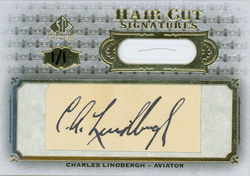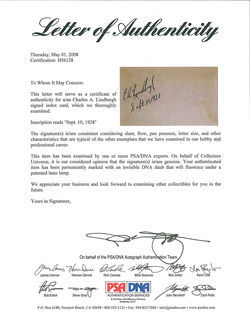Anyone who wants another person (esp one they don't know or never met) on anything other than a check or a contract, deserves what they get.
Autograph Fakery: Two Firms Monopolize a Lucrative Business

There aren't many places more sublime than Augusta National Golf Club on an early April morning. Dew sparkles on the greens, delicately raked sand traps beckon, and the best golfers on Earth stroll around the fairways, imagining the strokes they hope will lead to the Masters' green jacket.
April 9, 1997, was one of those mornings. Just outside America's most famous course, Scott Maurer set up his tent and helped a couple of other employees from the South Miami shop where he worked to hang racks of autographed photos of greats like Arnold Palmer and Jack Nicklaus and up-and-comers like Tiger Woods. Over the past decade, the company where Maurer worked as director, Gotta Have It Golf, had become one of the nation's biggest dealers by selling thousands of signatures like these.
Before they could finish setting up, though, a pair of cops from the local Richmond County department strolled up and slapped handcuffs on Maurer and three other employees. They were all under arrest, the cops told the stunned men, for forging golf stars' signatures. The arrests soon made headlines from Sports Illustrated to Golf Digest, as Woods' sports agency declared that the stars were getting tough on fake autographs.


Related Stories
 The Five Best Sneaker Boutiques in MiamiAugust 28, 2014
The Five Best Sneaker Boutiques in MiamiAugust 28, 2014 Sneakerheads UniteJune 19, 2014
Sneakerheads UniteJune 19, 2014 LeBron James Is Better Than Michael Jordan Ever WasJune 5, 2014
LeBron James Is Better Than Michael Jordan Ever WasJune 5, 2014 LeBron James Is Better Than Michael Jordan Ever WasMay 28, 2014
LeBron James Is Better Than Michael Jordan Ever WasMay 28, 2014 Christy's in Coral Gables Offers $35 Dining SpecialNovember 20, 2013
Christy's in Coral Gables Offers $35 Dining SpecialNovember 20, 2013
More About
It was a sensational story with one big problem: Claims the signatures were fake would prove exceedingly difficult to prove, a fact that sparked a fiery two-decade legal battle that ended only last week in a Miami courtroom with a six-figure judgment against Tiger Woods.
The feud illustrates a deeper conflict that's roiling America's booming memorabilia market: the role of paid "authenticators" whose say-so drives the value of collectibles. Two companies in particular have come to dominate the niche industry of "verifying" celebrity autographs.
Today, few autographs are bought or sold without the blessing of either Professional Sports Authenticator (PSA) or its competitor, James Spence Authentication (JSA). Business is so good that they use garbage cans to hold the cash they collect from reviews at hobby conventions. eBay, the world's largest facilitator of memorabilia auctions, endorses both companies to its customers. Nothing seems beyond their expertise, from Frank Sinatra's scrawl to baseballs defaced by Mickey Mantle.
And there's good reason their blessing is so coveted. An unauthenticated signature from Babe Ruth might sell for $250, with bidders wary of its pedigree. But with PSA's endorsement, the same Ruth shoots up to $2,900.
Yet PSA, JSA, and independent experts — like the one that Woods and Palmer used to bolster the arrest of the Miami memorabilia dealers — all have the same problem: They sometimes get it wrong. While the specialists say their services have cleaned up an industry rife with fraud, critics say their "expert authentication" is little more than pseudoscience used to generate millions in profits at collectors' expense.
"A third-party authenticator can't honestly tell you they can verify any signature, yet they are the single biggest factor in whether you can sell many autographs," says Michael Rypel, director of acquisitions and examination at the Miami store at the center of the Woods lawsuit, which is now called Millionaire Gallery. "To me, it's criminal what they're doing, but no one seems interested in doing anything about it."
There's little doubt the world's expanding taste for memorabilia — particularly autographs — has produced an industry that's rampant with fakery. The FBI's Operation Bullpen sting in the late 1990s showed how bad the problem had become when it swept up massive forgery rings around the country.
The investigation gained steam when an investigator for baseball card company Upper Deck, which had an exclusive deal with Michael Jordan, noticed Jordan's signature on items he knew Jordan had never signed. Agents uncovered forgers passing everything from "signed" NFL helmets to baseballs autographed by Mother Teresa. The merchandise bled into virtually every state, leading to more than 60 search warrants and dozens of arrests.
All told, the bureau estimated that more than $100 million was spent on fraudulent goods —some via unwitting outlets like QVC, others through complicit dealers. The agency still estimates that as much as 90 percent of the sports collectible market is bogus, says Rypel.
All those fakes stunned the billion-dollar memorabilia industry and created consumer paranoia: How could anyone be really sure that Jordan, and not a fry cook, had signed a pair of Nikes?
The answer was obvious to David Hall, a hobbyist who founded a coin-grading service in the 1980s before branching out to sports cards in 1991. In 1998, Hall's company, Collectors Universe, decided to launch PSA/DNA, an autograph-authentication service that would help alleviate concerns about forgers.
"I think that the beginning of the third-party companies really started commensurate with eBay," says Bill Panagopulos, an auctioneer who operates Alexander Autographs in Maryland. "There were so many fraudulent dealers on there that someone saw the opportunity to make money."
Thanks in part to aggressive marketing and consumers shaken by the Bullpen headlines, PSA blossomed, offering to stamp items with invisible "DNA" ink and providing "Letters of Authenticity" from a panel of experts. The company's prices range from $20 to look at Nicolas Cage's signature to $500 for its judgment on a Babe Ruth.
But there is no such thing as autograph school, says Panagopulos, and no degree can prepare you for the nuances of Ty Cobb's scribbling. Authenticators become proficient by looking at tens of thousands of signatures, analyzing habits, letter sizing, and a confident hand.


Anyone who wants someone signature on anything other than a check or a contract , deserves whatever they get.
Why are the FBI and the feds even involved? Isn't it a matter for the civil courts?
Oh right. Because Cronyism
I was trial counsel for the Federal government on a case generated by the FBI & Operation Bullpen some ten years ago. The counterfeiter - a Broward resident - was selling autographed memorabilia principally at South Florida memorabilia shows and through EBay. The FBI seized an entire garage full of purported fakes, some of which was allegedly signed by Ken Griffey, Jr. When FBI agents showed Griffey signed articles, he indicated that the items were forgeries. Three years later as the case made it's way to trial, the agents again showed Griffey the merchandise. This time around, he identified the signatures as being authentic. He was struck as a witness. Here's what I learned from that experience: If you can't get a straight answer out of the source of the autograph, how can you have any expectation of getting an accurate answer from a self-described expert? I came to conclude that unless an item is signed in your presence, it's most likely a forgery. Pay accordingly.
Now Trending
Around The Web
-
 OC Weekly's Year In Review 2013
OC Weekly
OC Weekly's Year In Review 2013
OC Weekly
-
 An antiquated city charter shows South Florida's puritanical and hilarious past.
New Times Broward-Palm Beach
An antiquated city charter shows South Florida's puritanical and hilarious past.
New Times Broward-Palm Beach
-
 Houston is Not an Ugly City
Houston Press
Houston is Not an Ugly City
Houston Press
New Times on Facebook
Special Reports
- Tony Bosch and Biogenesis: MLB Steroid Scandal
- Pain & Gain: From New Times Story to Michael Bay Film
- Israel Hernandez: Tasered to Death
- McKay Scholarship Investigation
- Bosco Enriquez: Snitched & Ditched
- George Alan Rekers and the Rent Boy
- Haiti Earthquake Coverage
- Homeless Sex Offenders
- More Special Reports >>
-
My Account
Log In
Join -
Connect
Facebook
Twitter
Newsletters
Things To Do App -
Advertising
Contact Us
National
Agency Services
Classified
Infographics
-
Company
Privacy Policy
Terms of Use
Site Problems?
Careers








































